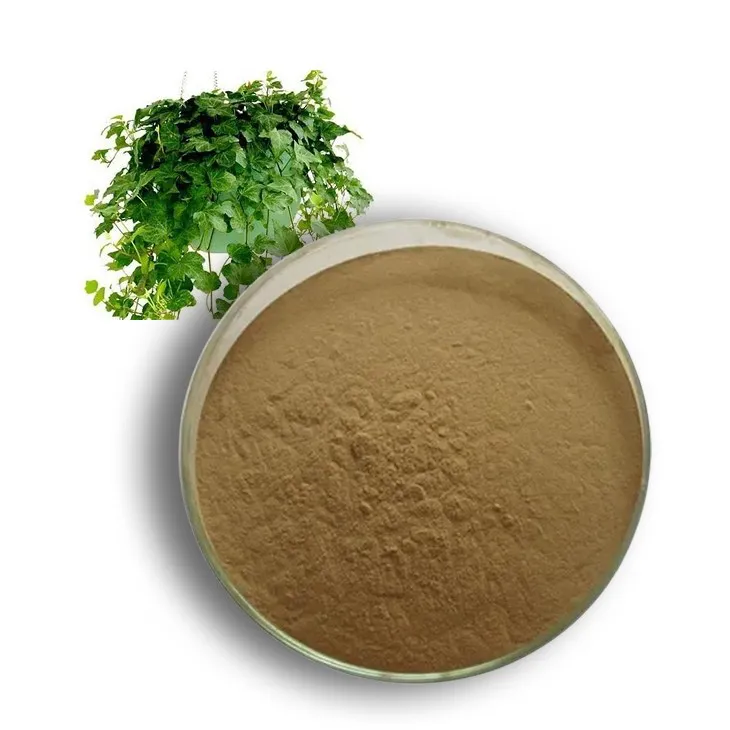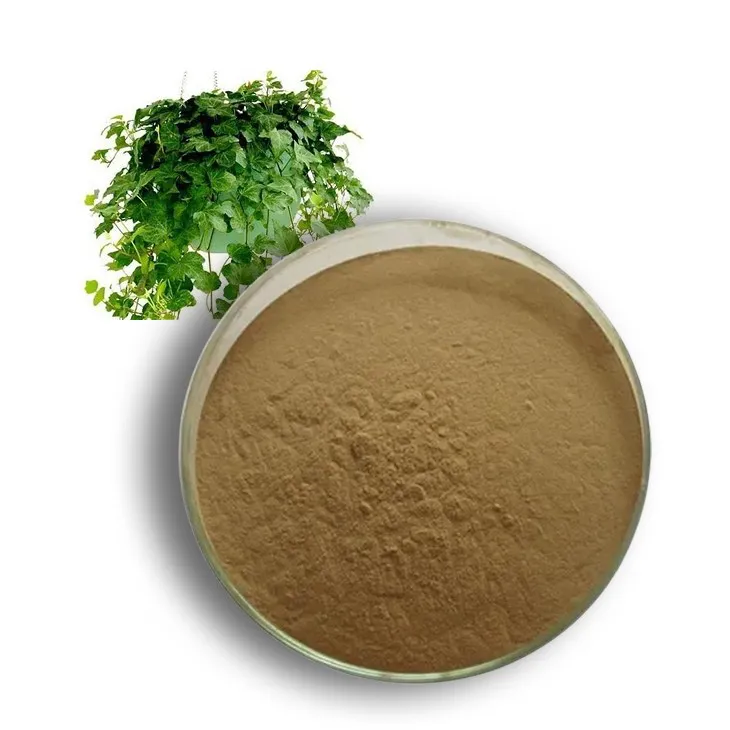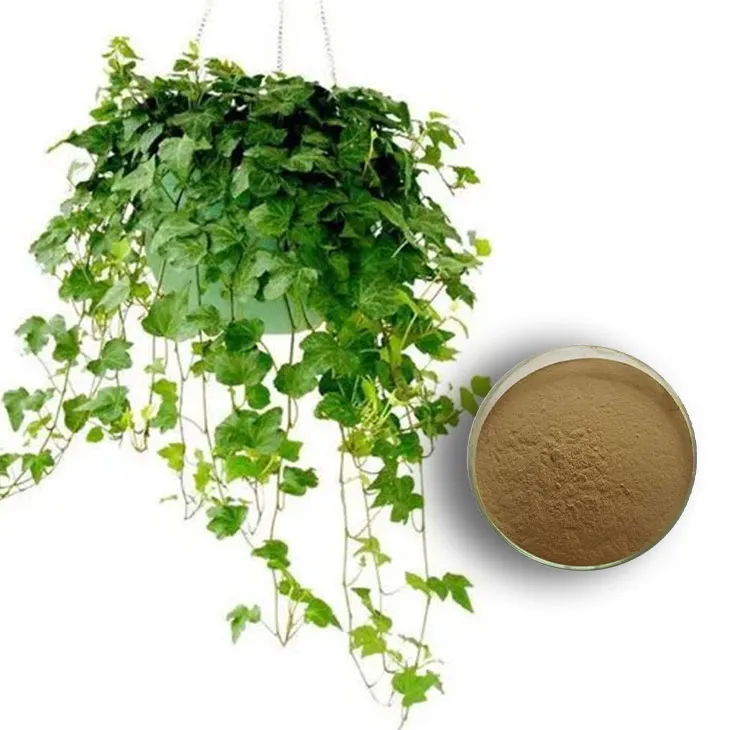- 0086-571-85302990
- sales@greenskybio.com
What is ivy extract and why is it used on the skin?
2024-11-14

I. Introduction to Ivy Extract
Ivy Extract is a substance obtained through extraction processes from ivy plants. Ivy, a common plant in many regions, has been found to possess certain properties that are valuable when transferred into an extract form for various applications, especially in the field of skin care.

II. Bioactive Compounds in Ivy Extract
Ivy extract contains a variety of bioactive compounds that contribute to its beneficial effects on the skin. These compounds are the key elements that make it a popular ingredient in skin - care products.
1. Saponins
Saponins are one of the important components in ivy extract. They have antimicrobial properties which play a role in inhibiting the growth of harmful microorganisms on the skin. Saponins can disrupt the cell membranes of bacteria, fungi, and other pathogens, thus reducing the risk of infections.
2. Flavonoids
Flavonoids present in ivy extract are known for their antioxidant capabilities. They can scavenge free radicals in the skin, which are often produced due to environmental factors such as UV radiation, pollution, and smoking. By neutralizing these free radicals, flavonoids help in preventing premature skin aging, such as the formation of wrinkles and loss of skin elasticity.

III. Benefits of Ivy Extract for the Skin
1. Antibacterial Function
One of the primary benefits of ivy extract on the skin is its antibacterial function. The skin is constantly exposed to various bacteria, and some of them can cause infections, especially when the skin barrier is compromised. Ivy extract can inhibit the growth of bacteria on the skin surface.
For example, in cases of minor cuts or abrasions, using products containing ivy extract can help prevent bacteria from entering the wound and causing an infection. This is particularly useful for people with active lifestyles or those who are more prone to skin injuries.
2. Exfoliating Properties
Ivy extract is also renowned for its exfoliating properties. The outer layer of the skin consists of dead skin cells that need to be regularly removed to maintain a healthy complexion.
Ivy extract can gently break down the bonds between dead skin cells, allowing them to be sloughed off more easily. This process promotes cell renewal, as it encourages the underlying skin cells to move to the surface more quickly. As a result, the skin appears smoother, with a more even texture. Regular exfoliation with ivy - extract - containing products can also improve the absorption of other skin - care products, such as moisturizers and serums.
3. Anti - itch Properties
Another advantage of ivy extract for the skin is its anti - itch properties. Itchy skin can be caused by a variety of factors, including allergic reactions, insect bites, and certain skin diseases.
When applied to itchy skin, ivy extract can soothe the irritation and reduce the urge to scratch. Scratching can further damage the skin, leading to inflammation, redness, and even infections. By alleviating the itch, ivy extract helps in maintaining the integrity of the skin and promoting the healing process.

IV. How Ivy Extract is Used in Skin - care Products
Ivy extract is used in a variety of skin - care products, depending on its intended benefits and the target skin concerns.
1. Cleansers
In cleansers, ivy extract can help remove dirt, oil, and bacteria from the skin while also providing some antibacterial protection. It can be especially beneficial for people with oily or acne - prone skin, as it helps keep the pores clean and reduces the risk of bacterial infections that can lead to breakouts.
2. Exfoliators
As mentioned earlier, ivy extract's exfoliating properties make it a great ingredient in exfoliators. These products can come in the form of scrubs, which contain small particles along with the ivy extract to physically remove dead skin cells, or chemical exfoliators, where the ivy extract works at a molecular level to break down the bonds between dead skin cells.
3. Creams and Lotions
In creams and lotions, ivy extract can provide multiple benefits. It can help soothe itchy or irritated skin, while also contributing to the overall health and appearance of the skin. For example, in anti - aging creams, the antioxidant properties of ivy extract can help protect the skin from free radical damage, while in moisturizing lotions, it can enhance the skin's texture by promoting cell renewal.
V. Precautions and Considerations
While ivy extract has many potential benefits for the skin, there are also some precautions and considerations to keep in mind.
1. Allergic Reactions
Some people may be allergic to ivy extract. Allergic reactions can range from mild redness and itching to more severe symptoms such as swelling and difficulty breathing. Before using a product containing ivy extract, it is advisable to do a patch test on a small area of the skin to check for any adverse reactions.
2. Concentration and Quality
The concentration of ivy extract in skin - care products can vary, and it is important to ensure that the product contains an appropriate amount for the desired effect. Additionally, the quality of the ivy extract can also impact its effectiveness and safety. It is recommended to choose products from reputable brands that adhere to strict quality control standards.
VI. Conclusion
Ivy extract is a valuable ingredient in skin - care due to its various bioactive compounds and the resulting benefits for the skin. Its antibacterial, exfoliating, and anti - itch properties make it useful for a range of skin concerns. However, as with any skin - care ingredient, it is important to be aware of potential allergies and to choose products of good quality. With proper use, ivy extract can contribute to healthier and more beautiful skin.
FAQ:
Is ivy extract safe for all skin types?
While ivy extract can have many benefits for the skin, it may not be safe for all skin types. Some people may be allergic to ivy, and using ivy extract on their skin could cause an allergic reaction such as redness, itching, or swelling. It is always advisable to do a patch test on a small area of skin before using any product containing ivy extract, especially if you have sensitive skin.
How is ivy extract incorporated into skin care products?
Ivy extract can be incorporated into skin care products in various ways. It can be added during the formulation process of creams, lotions, gels, or serums. Manufacturers usually ensure that the concentration of ivy extract is appropriate to achieve the desired skin benefits without causing any harm. For example, in exfoliating products, the amount of ivy extract is adjusted to provide gentle exfoliation, and in antibacterial products, it is present in a concentration sufficient to combat bacteria on the skin.
Can ivy extract help with acne - prone skin?
Yes, ivy extract can potentially help with acne - prone skin. Its antibacterial properties can target the bacteria that contribute to acne formation, such as Propionibacterium acnes. By reducing the bacterial load on the skin, it can help prevent breakouts. Additionally, its exfoliating properties can also play a role. Dead skin cells can clog pores and contribute to acne, and ivy extract's ability to remove these cells can keep the pores clear, reducing the likelihood of acne development.
Are there any side effects of using ivy extract on the skin?
As mentioned earlier, allergic reactions are a potential side effect, especially for those with ivy allergies. In some cases, if used in high concentrations or for extended periods without proper skin tolerance testing, it could cause skin irritation. However, when used correctly and in appropriate formulations, the incidence of side effects is relatively low.
How long does it take to see results when using skin products with ivy extract?
The time it takes to see results can vary depending on several factors. For example, if you are using it for exfoliation, you may start to notice a smoother skin texture within a few days to a week as dead skin cells are gradually removed. However, for more long - term benefits such as improving overall skin health or reducing the frequency of skin infections, it may take several weeks to months of consistent use. This is because skin cell renewal is a continuous process, and it takes time for the beneficial effects of ivy extract to fully manifest.
Related literature
- The Benefits of Ivy Extract in Skin Care: A Comprehensive Review"
- "Ivy Extract and Skin Health: An In - Depth Analysis"
- "The Role of Ivy Extract in Modern Skin Care Formulations"
- ▶ Hesperidin
- ▶ citrus bioflavonoids
- ▶ plant extract
- ▶ lycopene
- ▶ Diosmin
- ▶ Grape seed extract
- ▶ Sea buckthorn Juice Powder
- ▶ Beetroot powder
- ▶ Hops Extract
- ▶ Artichoke Extract
- ▶ Reishi mushroom extract
- ▶ Astaxanthin
- ▶ Green Tea Extract
- ▶ Curcumin Extract
- ▶ Horse Chestnut Extract
- ▶ Other Problems
- ▶ Boswellia Serrata Extract
- ▶ Resveratrol Extract
- ▶ Marigold Extract
- ▶ Grape Leaf Extract
- ▶ blog3
- ▶ blog4
- ▶ blog5
-
Organic Tongkat Ali extract powder factory.
2024-11-14
-
How to make powder with ashwagandha extract.
2024-11-14
-
Rosehip extract manufacturers from China.
2024-11-14
-
The best cat's claw extract in nature.
2024-11-14
-
Chinese Dandelion Leaf Extract Suppliers.
2024-11-14
-
Curcumin Extract
2024-11-14
-
Lotus leaf extract
2024-11-14
-
Cactus Extract
2024-11-14
-
Pueraria Lobata Extract
2024-11-14
-
Camu Camu Extract
2024-11-14
-
Golden Seal Extract
2024-11-14
-
Medicinal Marshmallow Extract
2024-11-14
-
Troxerutin
2024-11-14
-
White mustard seed extract
2024-11-14
-
Selenium yeast
2024-11-14





















